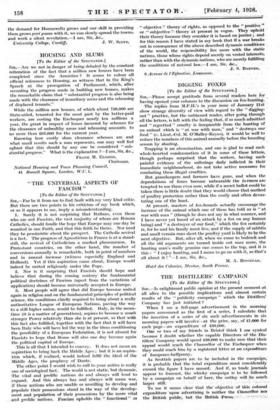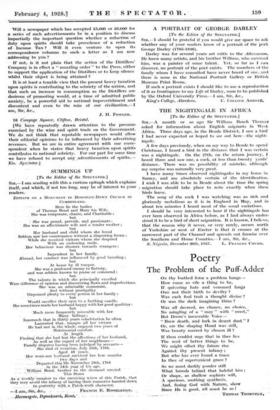THE DISTILLERS' CAMPAIGN [To the Editor of the SPECTATOR.] SIR,—Is
enlightened public opinion at the present moment at all alive to the possible implications and almost certain results of the " publicity campaign " which the Distillers' Company has just initiated ?
When I see a full-page advertisement in the morning papers announced as the first of a series, I calculate that the insertion of a series of six such -advertisements in six morning papers will involi'e—at the price, say, of £1,000 for each page—an expenditure of 186,000.
- One or two of my friends in Bristol think I am eynical because I doubt whether the capable Directors of the Dis- tillers' Company would spend 136,000 to make sure that their appeal would reach the Chancellor of the Exchequer- when they could reach him by a registered letter at an expenditure of fourpence-halfpenny.
As Scottish papers are to be included in the campaign, it is probable that the total expenditure must considerably exceed the figure I have named: And if, as trade journals appear to forecast, the whisky campaign is to be followed by a campaign on behalf of beer, the outlay will le much larger still: -
To me it seems clear that the objective of this colossal expenditure -upon advertising is neither the Chancellor nor the British public, but the British •Pressi-
'Will a newspaper which has accepted £5,000 or £6,000 for a series of such advertisements be in a position to discuss impartially the important question whether a reduction of duty .upon spirits should take precedence of a reduction of Income. Tax ? Will it even venture to open its correspondence columns to such a letter as I am now nddressing to you ?
If not, is it not plain that the action of the Distillers' Company is in effect a " muzzling order " to the Press, -either to support the application of the Distillers or to keep silence whilst their object is being attained ?
It is at least a tenable view that the present heavy taxation upon spirits is contributing to the sobriety of the nation, and that such an increase in consumption as the Distillers are desirous of promoting would, at a time of admitted public anxiety, be's powerful aid to national impoverishment and discontent and even to the ruin of our eivilization.—I am, Sir,. le.,
[We have repeatedly drawn attention to the pressure exercised by the wine and spirit trade on the Government. We do not think that reputable newspapers would allow their editorial opinions to be influenced by their advertising revenues. But we are in entire agreement with our corre- spondent when he states that heavy taxation upon spirits contrihutes to national sobriety. For our part for some time we have refused to accept any Advertisements of spirits.— En. Spectator.]







































 Previous page
Previous page